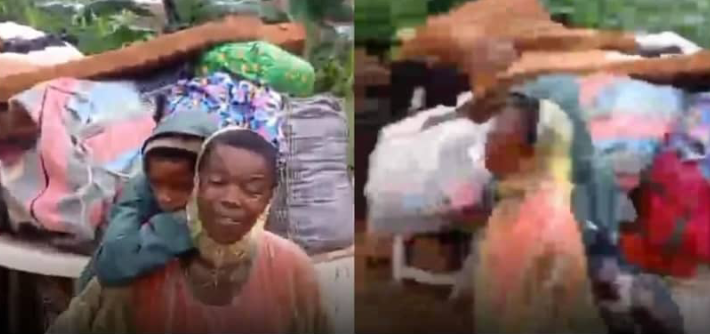
“Thrown into the Rain with My Children” — Anambra Widow’s Painful Cry for Justice After In-Laws Demolish Her Home

In a heart-wrenching tale of betrayal, loss, and abandonment, Mrs. Eze-Onwumere Vivian of Anambra State has found herself battling not only the grief of her husband’s death but also a horrifying family feud that has left her and her children homeless and traumatized. Her voice, trembling with emotion, cuts through the silence of injustice as she recounts how her husband’s family—those once considered kin—turned against her in the most brutal way.
Vivian’s world fell apart on December 17, 2023, when her husband, Philimon Eze-Onwumere, passed away after a period of illness. Instead of being surrounded by love, compassion, and support in her mourning, Vivian was met with a cruel twist of fate. She was allegedly disowned by her late husband’s brother, Isaiah Eze-Onwumere, and his children, who not only denied her status as a wife but also questioned the very legitimacy of her children. The shock and betrayal cut deep.
“I was thrown into the rain with my children like we were strangers,” Vivian told SaharaReporters with tears in her eyes. “They denied that my children belong to their late brother. Can you imagine such wickedness?” Despite presenting evidence of her traditional marriage to Philimon—held in her hometown in Nsukka and witnessed by numerous members of his family—her in-laws, she claims, have continued to deny her the dignity of her status as a wife and mother.
Her story is not just one of rejection but of calculated dispossession. With her husband barely buried, the family allegedly began plotting to take over the only property she had left—the land where she and her children lived. Just ten days after his death, they moved to sell the land. But Vivian, armed with grief and courage, took a stand. She approached the Ministry of Land and placed a caveat to halt the transaction.
“No one supported me while my husband was sick,” she recalled bitterly. “It was just me and his elder brother, Christian, who struggled and spent money on hospital bills and care. The rest of the family was nowhere to be found. But now, suddenly, they want to sell everything like vultures.”
She specifically named one of Isaiah’s sons, Ebuka, as the ringleader in the effort to claim and sell the property. “Ebuka didn’t contribute a kobo when my husband was dying. He didn’t show up once. But now he claims he has the right to sell the land that my husband left behind. I refused to allow that, and now I am being punished.”
That punishment reached an unimaginable level on July 4, when her worst fears materialized. She had gone out to purchase household items, only to return to a nightmare. Her belongings were scattered on the ground, drenched by the pouring rain, and her home was in ruins. The roof had been torn apart. The house, demolished.
“I screamed when I saw it. Everything was wet—our clothes, documents, furniture. We had nowhere to go,” she recounted. “They claimed there was a court order, but I never saw anything. No one served me any notice.”
Vivian said the act was not only inhumane but a calculated move to erase her existence from the property. “They want to wipe me out completely—like I never existed. But I will not be silent.”
Her children, already traumatized by the loss of their father, now live with the added pain of being uprooted, disowned, and displaced. Vivian’s voice trembled as she described how they cried, clung to her, and asked questions she could not answer. “They kept asking why we can’t go home, why their things are outside. What do I tell them? That their own blood has turned against them?”
With her options running out and the threat of homelessness looming permanently, Vivian has made a desperate appeal to Anambra State Governor, Prof. Charles Soludo, and his wife. She begs for their intervention in restoring justice and dignity to her and her children.
“I am not asking for favors. I am asking for justice. I am asking that my children not be punished for the sins they did not commit—if there were any sins at all. I am asking that my husband’s memory not be destroyed by greed and wickedness,” she said with quiet determination.
Her story is more than personal; it reflects a broader issue faced by many widows across Nigeria, especially in rural communities. Custom, patriarchy, and unchecked family power often leave women like Vivian at the mercy of those who seek to erase them for their gain. These women, left vulnerable after the death of a spouse, are too often denied property rights, inheritance, and even basic human dignity.
Vivian’s story now echoes across social media, news platforms, and advocacy circles. It is drawing sympathy, anger, and calls for reform. Human rights activists are calling on the Anambra State Government, Ministry of Women Affairs, and civil society organizations to urgently take up her case and prevent further abuse. Already, some have begun mobilizing legal assistance and temporary shelter for her and her children, but the emotional wounds remain fresh.
For Vivian, however, the fight continues. “They can take the house, they can take the land, but they can’t take the truth. My husband married me. He loved me. These are his children. I will stand for them, even if I have to stand alone.”
Her resilience stands as a reminder that justice is not just a word, but a responsibility. One that society must uphold for women like Vivian who are stripped of everything but their voice. And now, she is using that voice to cry out—not just for herself—but for every widow who has ever been cast out, silenced, and erased.
And the world must listen.


